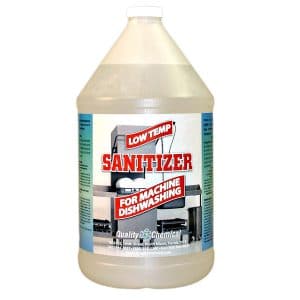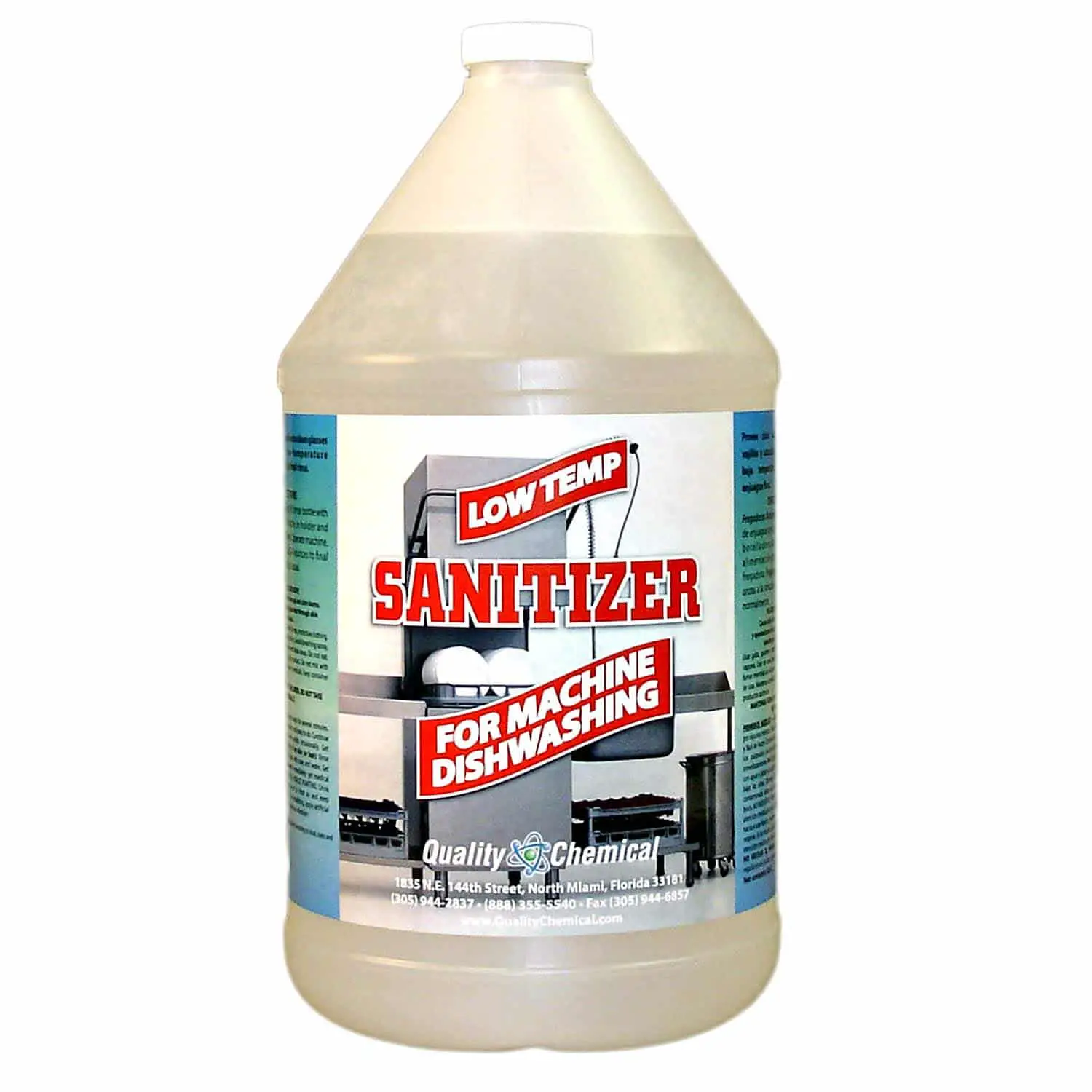The main reasons why a dishwasher smells are:
- improper cleaning
- drainage water flows back into the dishwasher
- drainage is blocked
- filter clogged with food particles
- keeping it close
- keeping dirty dishes inside (it’s worse if closed)
- the dishwasher was never degreased and sanitized
- dishwasher has plastic racks
- improper water softener
- other stuff near the dishwasher is causing the smell
Let’s explore each of them and eliminate them one by one.
1. Improper cleaning
Make sure you clean your dishwasher at least once every 2-3 months in order to prevent grease accumulation and other particles that can cause smells. The easiest way to do this is to buy a dishwasher sanitizer which is extremely cheap.

The dishwasher sanitizer penetrates, dissolves and removes odor-causing residue that can occur in all dishwashing machines. It cleans even the hidden places not reachable by hand.
You will need to run the dishwasher without any dishes in it and use the hottest program or mode.
The other option is to use a manual sanitizer, but this will involve washing the dishwasher with a soft cloth using the sanitizer.
If you will do this manually, make sure you wash the dishwasher sprayer arm ports and the place near the food particle filter. Those are the places where most of the food particles and dirt are blocked.
2. Drainage water flows back into the dishwasher
1. Drain hose is too low
The drain hose needs to rise above the dishwasher level and then fall into the drain. This is because the dishwasher has a pump that is able to push the water up to that level. It is designed this way because otherwise, the dirty water can flow back into the dishwasher causing odd smells and dirty dishes.
Elevate the drain hose to solve the problem.
2. Drain is blocked
If the first option doesn’t work, consider that your drain may be blocked and so causing the water to flow back into the dishwasher. Unless you find out that your drain hose is bent and so water is unable to flow correctly you will need to clean your drain or call a plumber in this case.
But first, here is a useful video if you want to try. This is for a sink drain but it applies to the dishwasher drain as well:
3. The filter is clogged with food particles
The dishwasher has a filter at the bottom in order to prevent unwanted stuff from going into the water pump. This, however, can be clogged or contain food particles from the dishes. The sign that you need to clear it is the smell or even food particles on dishes after washing. In order to clean it follow this video:
4. Keeping the door closed
Keeping the dishwasher close will facilitate the development of mold and bacteria that can cause smells of eggs, fish or mold. After stopping the dishwasher, there is a lot of humidity inside.
Make sure you keep the dishwasher open after you take the dishes out to let the water that is on the dishwasher walls dry. Ideally, you want to keep your dishwasher door cracked open all the time in order to prevent mold and bacteria. As we all know, mold and bacteria like humid and dark places. This comes hand in hand with the first tip. (keeping your dishwasher clean and sanitized)
5. Keeping dirty dishes inside (it’s worse if closed)
Keeping your dirty dishes inside is convenient as they no longer take space on the sink. However, the leftovers from the dishes are representing good food for bacteria and mold. Especially if the dishes are still wet and you keep the door closed.
You’ll want to prevent this habit and try to wash them as quickly as possible. Don’t let them say there for more than 1 day.
6. The dishwasher was never degreased and sanitized
This is a reinforcement of the first tip, but make sure you degrease your dishwasher. Even if it looks clean, there are hidden spots and most of the grease is invisible. Use a good degreasing substance.
7. Dishwasher has plastic racks
I found out that plastic racks tend to have a particular smell, especially when you keep the dishwasher door closed. This is normal and isn’t causing any problems. One thing to avoid is to wash plastic dishes in the dishwasher. You’ll notice that plastic dishes have a particular smell after washing because the detergent and rinse solution can be retained in the material.
8. Improper water softener
Scale buildup is the most frequent symptom. In rare cases, this can produce odd smells from the dishwasher and dishes.
Dishwashers use a water softener in order to eliminate dissolved calcium, magnesium, and other minerals effects. Did you know that 60mg of dissolved calcium and magnesium is enough to be considered that the water is “hard”?
Most often, the softener consists of salt which is added in a compartment at the bottom of the dishwasher. The dishwasher should have a way to set up the water hardness. Depending on this you may need to set up the level of harness (from 1-6 usually).
There are cheap water testers on Amazon so you can test how “hard” is the water but you can also try to contact your local water board and ask what’s the water hardness in your area. They might also have a public website.
Also, there are some particular salts designed to remove iron or other elements rather than calcium and magnesium. Iron removing salt can help with dishwasher odors.
Here’s how to refill the salt container.
Other stuff around the dishwasher
If none of the solutions above seems to solve your particular problem with dishwasher smell try to look around it for possible causes. The smells can come from other sources like:
- sink
- drain
- dead animal under, behind or near the dishwasher (like a rat or bugs)
- garbage near the dishwasher
- water itself (sulfur water is present in some areas causing a powerful rotten eggs smell)
Conclusion
The best way to maintain your dishwasher smell-free is to practice prevention. Clean your dishwasher periodically with a special dishwasher sanitizer.
You should also avoid putting dirty plates with large pieces of food or leftovers in the dishwasher. These will be blocked in the food particles filter or drainage and will cause odd smells.
Did you solve this issue in another way? Share your thoughts below in the comments section.
